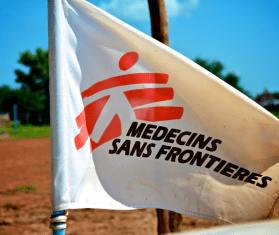MSF steps up its measles vaccination and medical response as year-long outbreak intensifies
NEW YORK, MAY 9, 2019—Parts of Chad, including the capital N’Djamena and the city of Am Timan, continue to battle a measles outbreak that was declared a year ago. In response, the international medical humanitarian organization Doctors Without Borders/Médecins Sans Frontières (MSF) carried out a vaccination campaign in Am Timan district and is calling for a national mass vaccination campaign for all children under the age of five. Measles remains a leading killer of young children all over the world despite the fact that an effective, low-cost vaccine has been available for decades.
Officially declared in Chad in May 2018, the measles outbreak has affected 69 of the country’s 126 districts. The outbreak began to intensify in January, with 9,000 cases and 68 deaths reported in the first three months of 2019. This is a huge increase from the previous year, when 5,336 measles cases and 96 deaths were reported by the Ministry of Health from May to December 2018.
“Chad has a pattern of measles outbreaks, which usually start in spring and die out when the rains start in June,” said MSF emergency coordinator Theresa Berthold. “However, 2018’s measles outbreak is still continuing. The epidemic is still not under control.”
A hunger gap on the horizon
MSF’s Chad Emergency Response Unit arrived in the city of Am Timan in January—when this new peak was declared—to respond to the ongoing outbreak. Over four weeks, 150 MSF staff members vaccinated 107,000 children in Am Timan city and 13 other locations in Am Timan district against the potentially life-threatening disease. This emergency team continues to help manage measles patients in Am Timan hospital and three health centers that provide free medical care. MSF teams in Am Timan cared for 1,677 children with complicated measles in the first three months of 2019.
Although this mass vaccination campaign is not the first to have taken place in Chad since the outbreak was declared, the current national response to control the outbreak appears to be insufficient.
To achieve “herd immunity”—community resistance to a disease because enough people are immune to it, usually because of vaccination—95 percent of children need to be vaccinated. Chad is far from achieving this, with just over one in three children under the age of five—37 percent—vaccinated against measles, and just one in four fully immunized against common childhood diseases, according to the latest data shared by Chadian health authorities. MSF is especially concerned right now because the seasonal hunger gap is approaching, a period of time each year between harvests where food is scarce.
“A concerted effort by the Ministry of Health and international organizations is needed to halt the epidemic,” said Martin Braaksma, MSF head of mission in Chad. “Without a national mass vaccination campaign for all children in Chad under the age of five, the health of the hundreds of thousands of malnourished children expected during the seasonal hunger gap starting in June or July will be jeopardized. A country-wide free measles treatment system should also be established.”
Reaching communities
During the vaccination campaign, thousands of mothers and fathers brought their children, sometimes from several miles away, to the vaccination sites or Am Timan hospital. Additionally, in the days leading up to the mass vaccination campaign, MSF’s team in Am Timan visited local communities—including the area’s nomadic population—to share information about protecting their children from measles.
“We had a number of nomad fathers coming from several miles away to get their children vaccinated after hearing about the campaign from our team,” Berthold said. “One of them took us to his community after so we could vaccinate all of the other children there.”
In N’Djamena, MSF has turned its former inpatient nutrition center that was set up in July 2018 into a measles unit to provide inpatient care for affected children. We've also increased support to health facilities in managing measles patients; so far, some 1,500 patients have been treated in 21 MSF-supported health centers. Measles has no cure, so the focus of care is on preventing dehydration, monitoring fever, and managing complications, which include eye and ear infections and pneumonia. Working with 270 community health workers, MSF is also supporting active case-finding to find children with measles and refer them for medical care.
Malnutrition and measles is a killer combination. Measles can worsen malnutrition, which in turn weakens the immune system, increasing the risk of death.
“It’s only by reaching the point where all children in Chad are fully immunized that future measles epidemics will be prevented and people will be allowed to escape the vicious circle of yearly outbreaks that put the lives of thousands of children at risk,” Braaksma said.
MSF has been working in Chad for 37 years. Our Chad Emergency Response Unit provides rapid medical responses to epidemic emergencies, providing free quality treatment and carrying out emergency vaccination campaigns. MSF also runs medical activities in Moïssala, in Chad’s Mandoul region.




